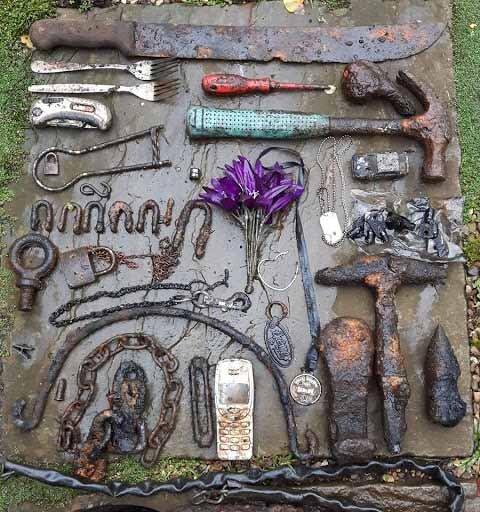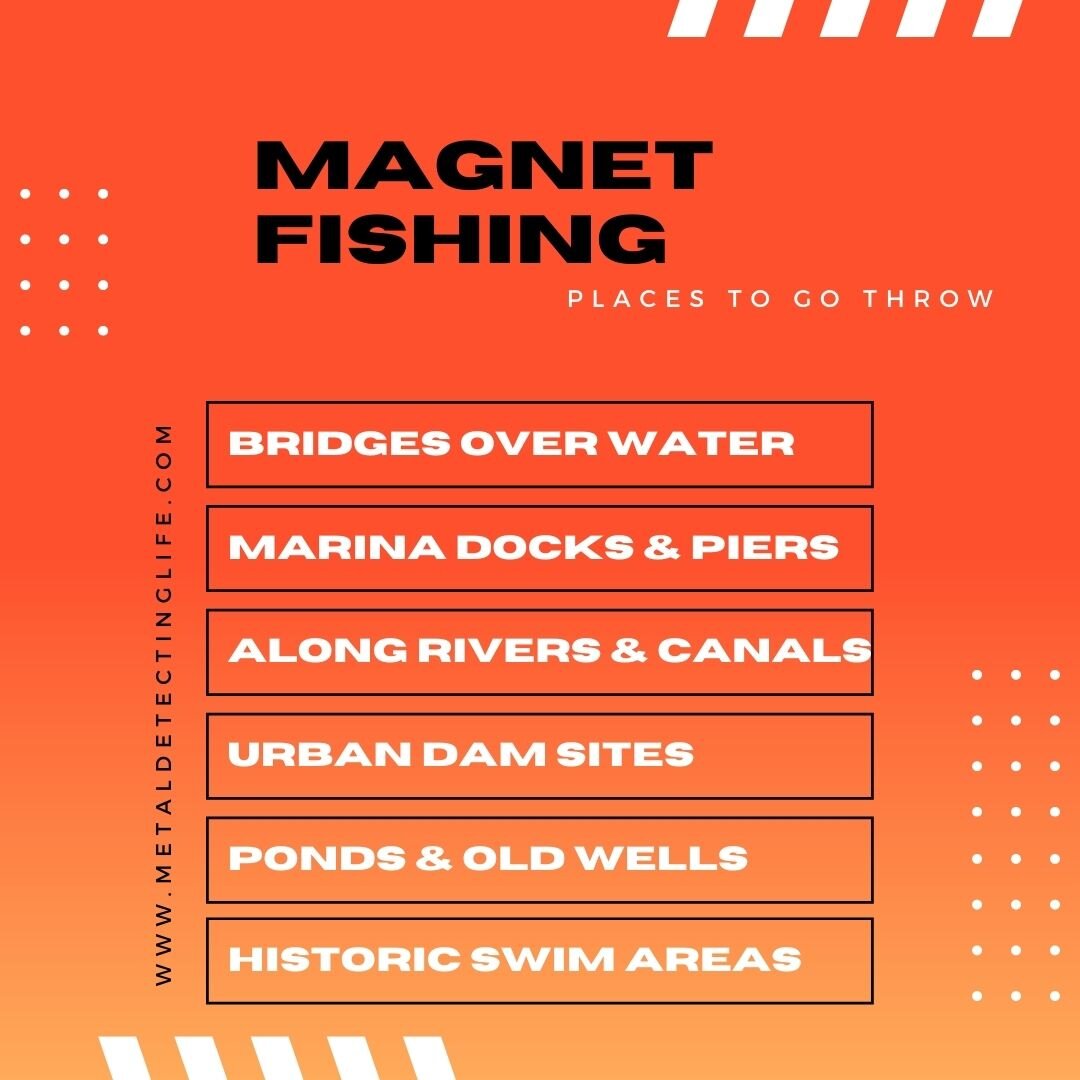What Is Magnet Fishing?
Magnet fishing is a relatively new hobby that combines the more traditional hobbies of fishing and metal detecting by the use of throwing a magnet that is attached to a rope out in to a body of water with the hopes of “catching” something magnetic that has either been lost or possibly thrown overboard on purpose.
**DISCLAIMER - As an Amazon Associate I earn from qualifying purchases. The links in the article are affiliate links that help support this blog and my channels. Metal Detecting Life is supported by you, the readers! When you purchase something I recommend via my links, I may get an affiliate commission (terms of service) — but it never affects the price you pay. Cheers!
What Can I Find Magnet Fishing?
Because magnets tend to stick to ferrous metal objects (one’s with iron content), you can expect to find items made of steel, cast iron, wrought iron, and any other metal that contains amounts of iron in them while out magnet fishing.
Items you won’t be able to find with your magnet while out magnet fishing include ones that are considered to be non-ferrous (lack iron content): Aluminum, copper, silver, gold, lead, and any other metal that doesn’t contain iron in its chemical makeup.
Is Magnet Fishing Profitable?
While it is unlikely you’ll largely profit from your magnet fishing finds, there is always the “holy grail” out there waiting to be found! What would that be you ask? Well, how does finding a safe or cash box packed with valuables inside sound?
A variety of finds from a day out magnet fishing. Photo Credit: Magnet Fishing USA
It may seem far fetched finding a safe packed with coins and gold, but it certainly is possible! Whether something like that ends up there from a bank robbery, store burglary, or maybe even a boat sinking during a storm, you may never know, but what a thrill it would be to come across!
*Certain laws may pertain to “lost & found” or “finders keepers” depending on your state and where the valuable was found.
Photo Credit: Justin Bautista - Unsplash
At the end of the day most of the items recovered will not bring in a significant profit, especially considering many of things recovered will have begun to corrode from being in the water over time. However, you may be able to get a small cash windfall from a scrap metal yard.
The real value in magnet fishing will be in the adventures and stories you’ll be able to tell friends and family with all the unique and interesting things you’ll have pulled from the water.
Gear Needed For Magnet Fishing
Magnets
The essential piece for anyone looking to begin their magnet fishing career, magnets come in various sizes and pull strengths. Due to their relatively small size yet powerful pulling force, a Neodymium magnet is often the one of choice.
King Kong Monster Fishing Magnet
If you are looking for one fishing magnet to meet your needs, this magnet from King Kong Magnetics should do the trick with 1200 pounds of pulling power
Rope
A magnet will only be as strong as the rope you are pulling it with. If the ropes towing strength becomes exceeded due to a large object on the other end of the magnet, the rope could potentially snap if it’s under immense pressure.
The best rope for magnet fishing is going to be a UV, rot resistant, double-braided nylon rope. Also, be sure to select a rope that give you enough length should you be magnet fishing in deeper waters or off of bridges. I would recommend a rope length of at least 100ft for the best magnet fishing experience.
Gloves
DEX FIT Level 5 Cut Resistant Gloves
Snug fit that protects hands and fingers from cuts and abrasions
Dealing with rusty, corroded metal that has been submerged for who knows how long can be dangerous to handle once you pull it from your magnet. It is also important to have a good grip on the rope as you tow your catch in. Having a good pair of gloves is essential in protecting yourself from unnecessary cuts or rope burns.
Another pair of gloves that I often use for cold-weather metal detecting are the the Redneck Convent Trapping Gauntlet Gloves (article below). These gloves offer many of the same benefits that a Magnet Fisher would be looking for in a good set of gloves.
Accessories
Other accessories you may want to consider having while magnet fishing include a bucket or bin to store and carry your treasures back to the car.
Having a storage box for your magnet when not in use will help keep it from becoming stuck to your car, trunk, or any additional items that you may be storing in your car, garage or home.
Magnet Fishing Kit With Case
Set includes, high quality waterproof case, strong magnet, grappling hook, rope, 2 carabiner, gloves, and threadlocker
Using thread locking glue will help secure the eyebolt from coming undone from the magnet because the worst thing that can happen is you latch on to something below the water and the bolt swivels loose, thus losing your magnet!
Carabiners can be used to quickly swap out magnets and rope sets depending on your preference. Just be sure that the carabiner can match the strength and weight of your magnet pulling an object so that the carabiner doesn’t bend and fail. You’ll also need to take extra care to properly knot the rope to your carabiner so that it does not come undone while in use.
Places To Go Magnet Fishing
Need help thinking of some locations to give magnet fishing a try? Here are a few go-to spots that are probably close to you!
Is Magnet Fishing Legal?
In the United States, magnet fishing is legal in 49 out of 50 states with South Carolina being the ONLY state at the present time that has a ban on the hobby of magnet fishing.
According to the University of South Carolina’s Maritime Research Division, “The primary reason magnet fishing is not permitted is that an operator on the surface cannot see what has been snagged by their magnet to determine whether it is partially buried beneath the sediment or attached to ferrous/magnetic hardware on a shipwreck or other submerged historic structure.”
In all other 49 states, hobbyists are permitted to enjoy magnet fishing along any public waterways. However, it must be noted that a person should not trespass on private property to gain access to a magnet fishing site.
What Are The Dangers Of Magnet Fishing?
Photo Credit: Edwin Hooper - Unsplash
Magnet fishing is a hobby that can be dangerous, so it is important that you take special precautions to insure you don’t end up in a bad situation.
Because you are throwing your magnet in to dark and deep waters, often times you have no idea what lies beneath or what you’ll be pulling up, so it is wise to always have someone with you in case something happens.
Photo Credit: Catrina Carrigan - Unsplash
If you are magnet fishing off of a pier or bridge, it is possible to slip or lose your balance and a fall in to the water could be catastrophic. Having a lifejacket or other floatation device on you could make all the difference in this situation.
Careful when pulling sharp items from your magnet. Photo Credit: Igor Bispo- Unsplash
Most of the items found while magnet fishing will be corroded, broken, or have sharp edges. Remember, you’re fishing for metal objects and the last thing you want is your hand to be cut from that grungy, rusted pipe or needle and needing a tetanus shot at the ER. So, do yourself a favor and wear a good set of gloves or other appropriate hand protection.
The magnets used are often very powerful and can attract and stick to a metal object even from a reasonable distance. The last thing you want is to have your fingers in between that metal object and the magnet as they could get crushed between the two. Keep in mind that just like a gun, ALWAYS know where your magnet is pointing.
Grenades have been found while magnet fishing. Photo Credit: Sven Verwii - Unsplash
Finally, there are some items that have been found from “magnet anglers” that could pose as an extremely hazard risk. Bombs! There have been instances where people have been magnet fishing and have pulled up items such as grenades, mortars, artillery shells, etc. and were not sure if those items were real or still live.
If you happen to find an item similar to this, please don’t toss it around like a football with your friends. Carefully leave it in place and call the police or proper authorities to come out and help determine the safest course of action.
What If A Gun Is Found Magnet Fishing?
If you happen to pull up a gun with your magnet, similar to finding an explosive device, call the police so they can come out and safely investigate the scene.
1st time magnet fisher found this item! Photo Credit: Bigtornado - Reddit
Most guns often find their way in to the waterways because the previous owner may have done something, such as commit a crime with it, and they wanted to attempt to discard the evidence by ditching it in to a pond or river.
Not all guns are tied to a crime though. It is possible some guns went overboard by accident, perhaps from a careless hunter or their kid decided to drop it off the boat.
If a magnet angler is truly lucky, they’ll have latched on to an antique gun that dates back to the Civil War era and was dropped most likely during battle. These guns depending on conditions could be very valuable and collectors would love to get their hands on them!
*If a gun is deemed an antique, it may be possible to keep once police have made a determination on its status, so ask for a case number.
Finding a gun can be a thrilling experience, but must be handled with care in case the gun is still loaded and operable, which you should assume in all instances.
With that in mind, once the gun has been pulled from the water, safely lower it to the ground and keep it pointed away from you and any bystanders. Try to handle the gun as little as possible so nothing is tampered with until the police arrive.
Because the gun is not registered to you, the police will determine the next course of action. If the gun has no serial number or the serial number comes back as being positive in connection with a crime, odds are you will not be able to keep the gun, so ask the police officer nicely if you can take a few pictures next to it for your magnet fishing “trophy” shelf. This way you’ll be able to show your friends for years to come and tell the story of “remember that one time!”
Magnet Fishing’s Golden Rule
““If you pull it... then you pack it.””
It is important to know that not every find is going to be a keeper. Helping dispose of the trash that is pulled from our lakes, rivers, and streams is a reward in of itself.
By following the “golden rule” and cleaning up these areas, it attracts a positive vibe about the hobby!
Is Magnet Fishing Worth It?
Photo Credit: Drahomir Hugo Posteby-Mach - Unsplash
Magnet fishing is a wonderful hobby that the whole family and all ages can enjoy. With a very low investment cost and an unlimited potential to explore new places and find some very interesting things, it is no wonder people are “attracted” to the world of magnet fishing.
So get out there and go get stuck on something because magnet fishing is certainly a hobby that is worth trying!
*As an Amazon Associate I earn from qualifying purchases.




























